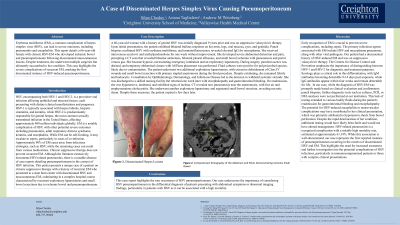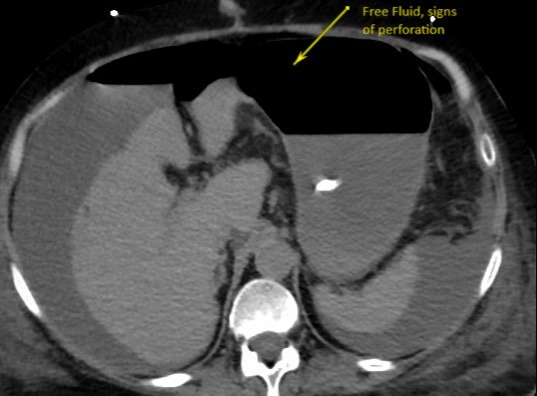Monday Poster Session
Category: Small Intestine
P3307 - A Case of Disseminated Herpes Simplex Virus Causing Pneumoperitoneum
Monday, October 28, 2024
10:30 AM - 4:00 PM ET
Location: Exhibit Hall E

Has Audio

Silpa Choday, MD
Creighton University School of Medicine
Phoenix, AZ
Presenting Author(s)
Silpa Choday, MD1, Ariana R. Tagliaferri, MD1, Phillip Leff, DO2, Andrew M. Weinberg, DO1
1Creighton University School of Medicine, Phoenix, AZ; 2Creighton University School of Medicine, Scottsdale, AZ
Introduction: Erythema multiforme (EM) is the most common complication of HSV, but other complications include pneumonitis, adult respiratory distress syndrome, keratitis, and encephalitis with cerebrovascular events such as stroke or hemorrhaging. Although these complications are well documented in current literature, especially in immunocompromised or critically ill patients, there are no known case reports of HSV-induced pneumoperitoneum. We present a patient with a history of HSV-EM on chronic suppressive therapy who succumbed to ischemic bowel and pneumoperitoneum secondary to mucocutaneous disseminated HSV-EM.
Case Description/Methods: A 66 year old female with a history of HSV-EM on suppressive therapy presented with disseminated bullous eruptions and necrotic sloughing-lesions on her extremities, trunk, genitalia, eyes, and mouth and met sepsis criteria. Punch biopsies with immunofluorescence revealed HSV-EM. Despite IV acyclovir, she had worsening leukocytosis and abdominal pain warranting a CT A/P with IV contrast revealing small bowel ischemia and underwent an ex-lap, drainage of purulent ascites, and was found to have micro-perforations of the small bowel. Fluid cultures were contaminated with normal gut flora. Due to persistent lactic acidosis, she ultimately had 3 additional surgeries with small bowel resection, wound debridement of the necrotic HSV lesions on her extremities and abdomen, abdominal wound closures (Class IV), and was found to have worsening pneumoperitoneum with areas of ulceration and necrosis pathologically on resected segments concerning for HSV. The patient did not clinically improve and expired.
Discussion: Although EM is typically self-limited, patients with recurrent EM are difficult to treat prophylactically and acutely and have a higher risk of complications. Despite ample documentation of these complications, including pneumonitis, this appears to be the first case describing disseminated HSV with EM-causing pneumoperitoneum.

Disclosures:
Silpa Choday, MD1, Ariana R. Tagliaferri, MD1, Phillip Leff, DO2, Andrew M. Weinberg, DO1. P3307 - A Case of Disseminated Herpes Simplex Virus Causing Pneumoperitoneum, ACG 2024 Annual Scientific Meeting Abstracts. Philadelphia, PA: American College of Gastroenterology.
1Creighton University School of Medicine, Phoenix, AZ; 2Creighton University School of Medicine, Scottsdale, AZ
Introduction: Erythema multiforme (EM) is the most common complication of HSV, but other complications include pneumonitis, adult respiratory distress syndrome, keratitis, and encephalitis with cerebrovascular events such as stroke or hemorrhaging. Although these complications are well documented in current literature, especially in immunocompromised or critically ill patients, there are no known case reports of HSV-induced pneumoperitoneum. We present a patient with a history of HSV-EM on chronic suppressive therapy who succumbed to ischemic bowel and pneumoperitoneum secondary to mucocutaneous disseminated HSV-EM.
Case Description/Methods: A 66 year old female with a history of HSV-EM on suppressive therapy presented with disseminated bullous eruptions and necrotic sloughing-lesions on her extremities, trunk, genitalia, eyes, and mouth and met sepsis criteria. Punch biopsies with immunofluorescence revealed HSV-EM. Despite IV acyclovir, she had worsening leukocytosis and abdominal pain warranting a CT A/P with IV contrast revealing small bowel ischemia and underwent an ex-lap, drainage of purulent ascites, and was found to have micro-perforations of the small bowel. Fluid cultures were contaminated with normal gut flora. Due to persistent lactic acidosis, she ultimately had 3 additional surgeries with small bowel resection, wound debridement of the necrotic HSV lesions on her extremities and abdomen, abdominal wound closures (Class IV), and was found to have worsening pneumoperitoneum with areas of ulceration and necrosis pathologically on resected segments concerning for HSV. The patient did not clinically improve and expired.
Discussion: Although EM is typically self-limited, patients with recurrent EM are difficult to treat prophylactically and acutely and have a higher risk of complications. Despite ample documentation of these complications, including pneumonitis, this appears to be the first case describing disseminated HSV with EM-causing pneumoperitoneum.

Figure: Computerized Tomography of the Abdomen and Pelvis Demonstrating Perforated Small Bowel
Disclosures:
Silpa Choday indicated no relevant financial relationships.
Ariana Tagliaferri indicated no relevant financial relationships.
Phillip Leff indicated no relevant financial relationships.
Andrew Weinberg indicated no relevant financial relationships.
Silpa Choday, MD1, Ariana R. Tagliaferri, MD1, Phillip Leff, DO2, Andrew M. Weinberg, DO1. P3307 - A Case of Disseminated Herpes Simplex Virus Causing Pneumoperitoneum, ACG 2024 Annual Scientific Meeting Abstracts. Philadelphia, PA: American College of Gastroenterology.
